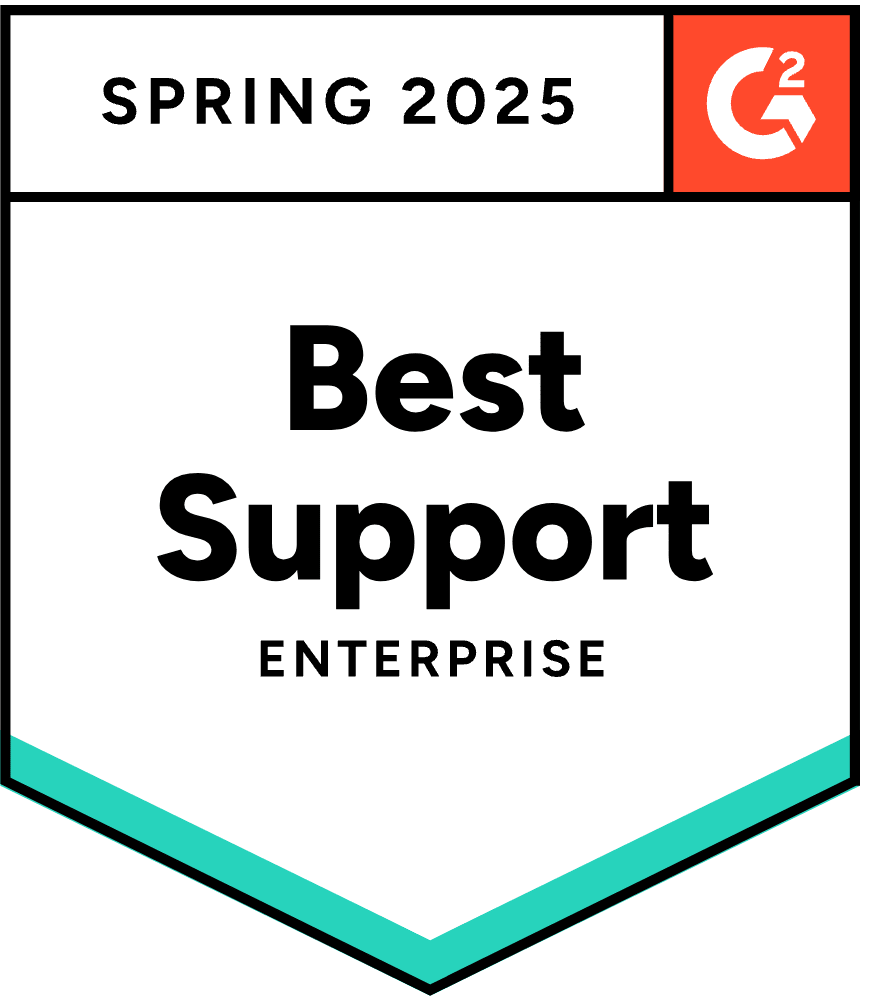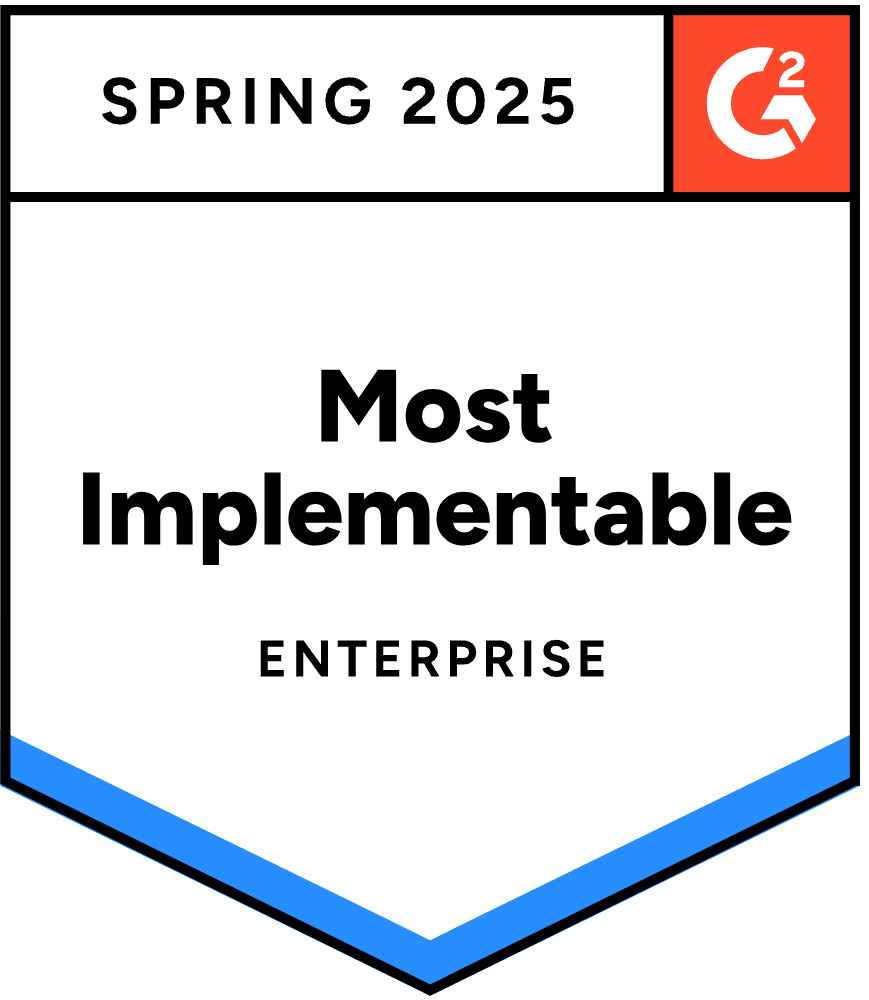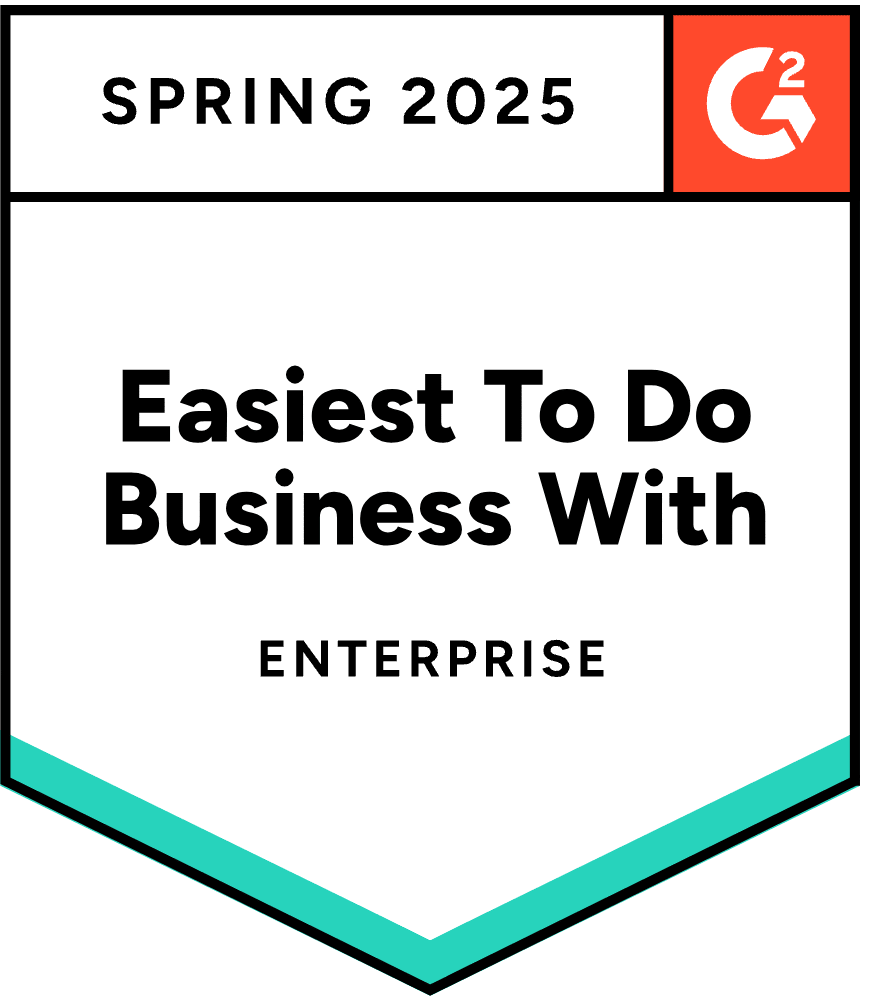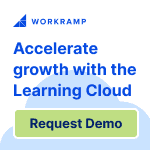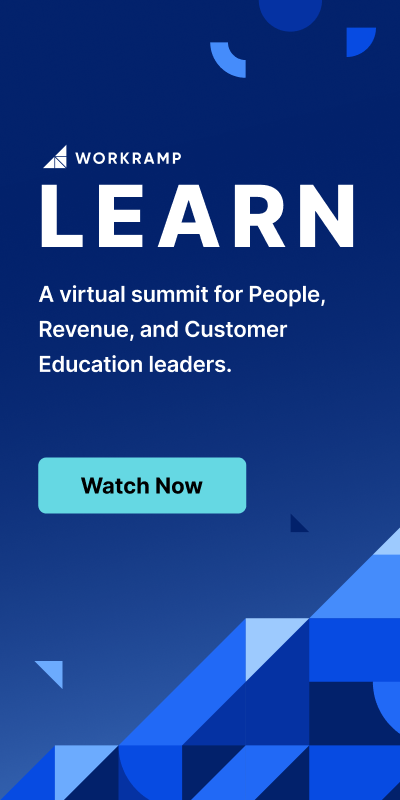Customer Success Training Tools: Accelerating Growth Through Customer Success
Michael Keenan | WorkRamp Contributor
View bioLearning Tips Straight to Your Inbox
Customer success tools are an emerging market estimated to reach $3.1 billion by 2026. KBV Research. And for good reason, customer success training tools are game-changing resources to improve efficiency and productivity for customer success teams.
But as more platforms enter the market, knowing which are the best for the job is essential.
What are the essential features, and how can you choose the best platform for your organization’s needs?
Understanding the must-have features and functionalities of customer success training tools can help you find the best solution to help your customers excel.
In this post:
What is a CSM tool?
A customer success training tool helps you manage, track, and improve customer relationships.
It aids your success initiatives and ensures customers get value from your products and services.
What does a customer success tool do?
Customer success teams use these tools to create positive experiences for customers. The tools often serve as a central hub where team members can monitor customer behavior, identify potential issues, and take action to solve them.
While every customer success tool is different, some key features may include:
- Customer data aggregation. These tools collect and centralize data from multiple sources, like your CRM, support ticket systems, billing portals, and more. It gives you a 360-degree view of the customer.
- Customer segmentation. These tools group customers into different segments based on the data you collect. You can establish segments based on factors like customer lifecycle stage, industry type, or usage patterns.
- Health scoring. You can also monitor customer health based on customer satisfaction scores, support ticket frequency, product usage, and other criteria.
- Task management and automation. Many customer success tools automate repetitive tasks, like ticket conversion and reporting. This way, CSMs can better manage their workload and prioritize tasks.
- Reporting and analytics. These tools provide insights into churn rate, customer lifetime value, product usage patterns, and more.
The Learning Cloud is an example of a customer success tool that helps organizations build academies to teach customers how to use their products better like Workiva did with the Workiva Learning Hub.
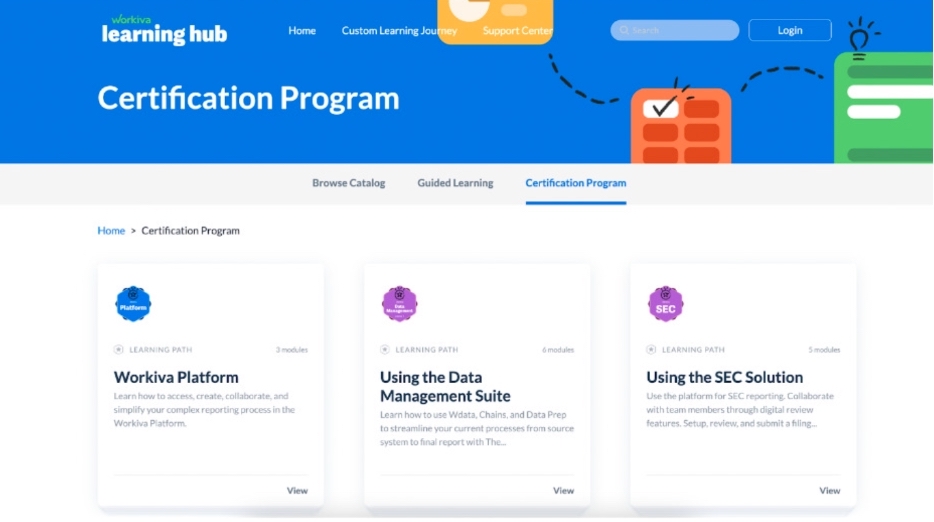
The training has various options, such as self-service learning, guided paths, and certifications, so customers can choose what works best for them. Program admins get alerts when customers face any issues, so they can reach out and proactively solve issues.
Overall, customer success tools are a critical part of your operations. They help you better understand customers, anticipate needs, provide customer education, and address any issues. That way, you can improve the customer experience and drive customer retention and growth.
Read more: How to Use Customer Education to Improve Customer Experience
Customer success training tools you should be using
Let’s look at a few of the top software tools available in four categories: support, success, chat, and LMS.
Customer support software
Support software is designed to help you streamline customer service operations. It includes features like ticketing systems, omnichannel communication, and reporting capabilities to track queries and resolutions.
Top software includes Zendesk, Freshdesk, and HubSpot Service Hub.
Zendesk
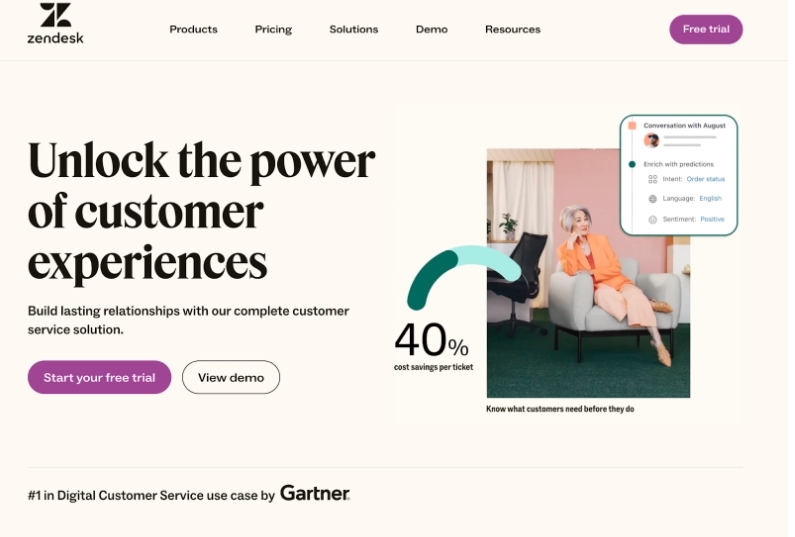
Zendesk offers a ticketing system that helps support teams manage queries efficiently.
Suppose a customer emails your support team with a question, then later sends a follow-up question through social media. Zendesk automatically links the two interactions together, ensuring your team has all the context they need when responding. This leads to quicker, more accurate responses and a better customer experience.
Features:
- Omnichannel support: Allows your team to manage customer interactions across multiple channels (e.g., email, chat, phone, social media) from one place
- AI-powered bot: Can answer common customer queries and learn from each interaction to improve over time
- Advanced ticketing system: Efficiently organizes customer queries and issues to ensure they’re handled effectively
- Knowledge base: Allows customers to self-serve by finding answers to common questions
- Analytics and reporting: Offers comprehensive insights into your support performance to drive continuous improvement
Price: $19 per month, per agent billed annually.
Freshdesk
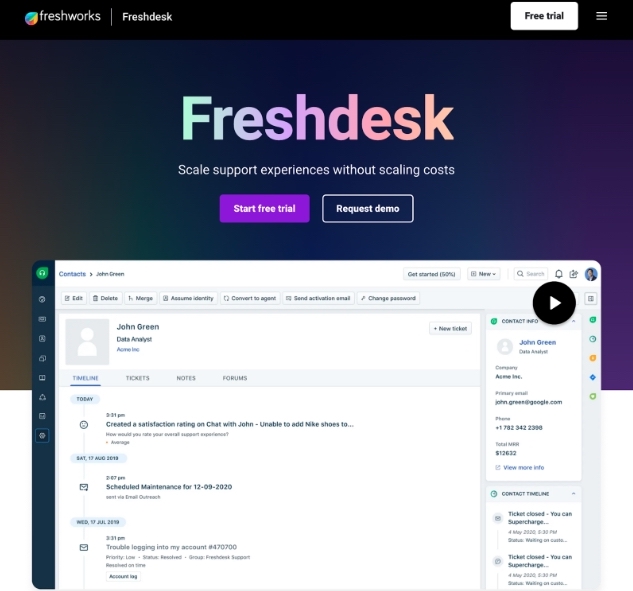
Freshdesk is a good choice for small businesses and companies just starting with customer support tools.
Let’s say you’re a small business dealing with repetitive customer queries about your hours. You can set up an automation in Freshdesk that automatically sends a response with the relevant information whenever a customer sends an email with the phrase “business hours.” This decreases your response times and frees up your team to focus on more complex issues.
Features:
- Collaborative inbox: Enables your team to manage and prioritize all customer conversations in one place
- Automation features: Automate repetitive tasks to increase efficiency and allow your team to focus on more complex issues
- Social media integration: Allows you to manage customer interactions across social media platforms directly within Freshdesk
- Multi-Language Support: Provides the ability to offer customer support in various languages
Price: Free for up to 10 agents. Paid plans start at $15 per month.
HubSpot Service Hub
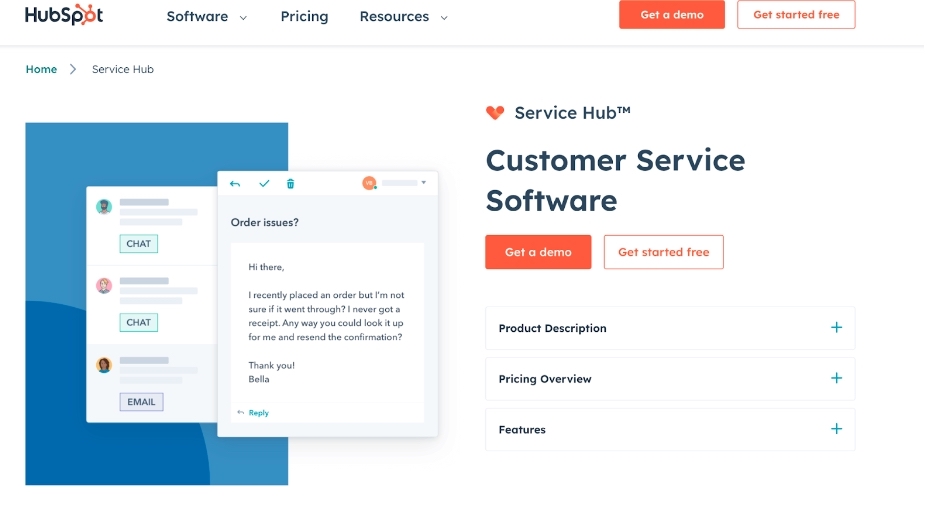
HubSpot Service Hub is part of the broader HubSpot ecosystem, so it’s seamlessly integrated with HubSpot’s other products, like their CRM, Marketing, and Sales hubs.
Consider a scenario where a customer who has previously interacted with your sales team now has a support issue. With Service Hub, your support team can quickly access the customer’s sales history and provide more personalized and effective support.
Features:
- Ticketing system: Allows you to track customer issues and ensure they’re resolved fast
- Automation: Automate routine tasks to free up your team for more critical issues
- Knowledge base: Helps customers find answers to their questions, reducing the load on your support team
- Customer feedback surveys: Collect and analyze feedback to understand your customers’ needs and improve your services
- Seamless integration with HubSpot CRM: Provides excellent visibility into customer data across different teams (sales, marketing, and service)
Price: $375 per month for 5 users.
Customer success software
Customer success software helps you understand, manage, and enhance the customer experience. It collects and analyzes customer data like product usage, feedback, and behavior.
You use the data to identify at-risk customers, create proactive engagement strategies, and improve customer retention.
A few tools include Gainsight, Totango, and ChurnZero.
Gainsight
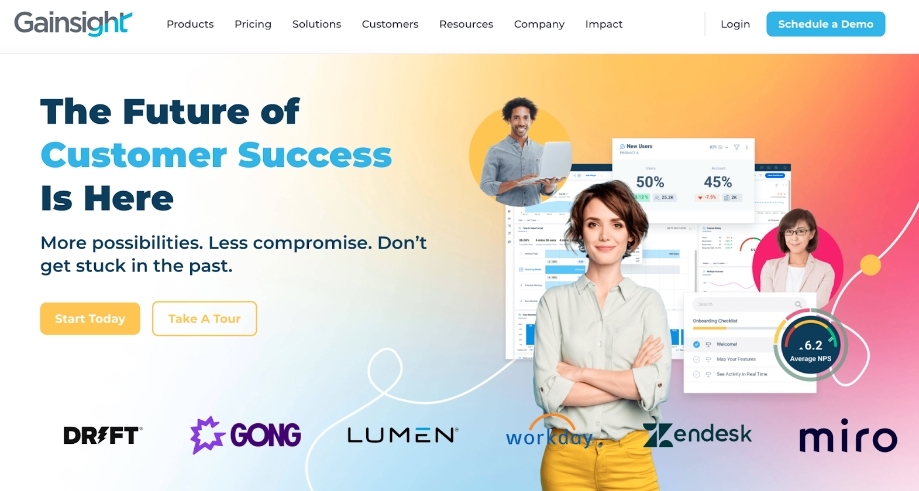
Gainsight offers a suite of tools for managing customer relationships and reducing churn. You can find everything from customer health scores to usage data and renewal dates in the dashboard. You can also create “Success plans” to outline and track objectives for individual customers.
Imagine you’re a SaaS company and you’re using Gainsight. Your dashboard shows that a particular customer has a low health score.
- They aren’t using your product much
- Their CSAT score is low
- Their contract renewal is coming up
Gainsight helps you create an action plan from this insight. You can create a Success plan to engage this customer by offering a training session or a product feature demo to increase their product usage and satisfaction.
Features:
- Customer health scores: This feature combines various metrics to provide an overall ‘score’ of your customer relationship
- Success plans: These are action plans created to improve customer satisfaction
- Risk alerts: It alerts when a customer may be at risk of churning or if there’s a notable change in behavior
- Journey orchestrator: Automates personalized customer communications to ensure they get the most from your product
Price: Request pricing on website.
Totango
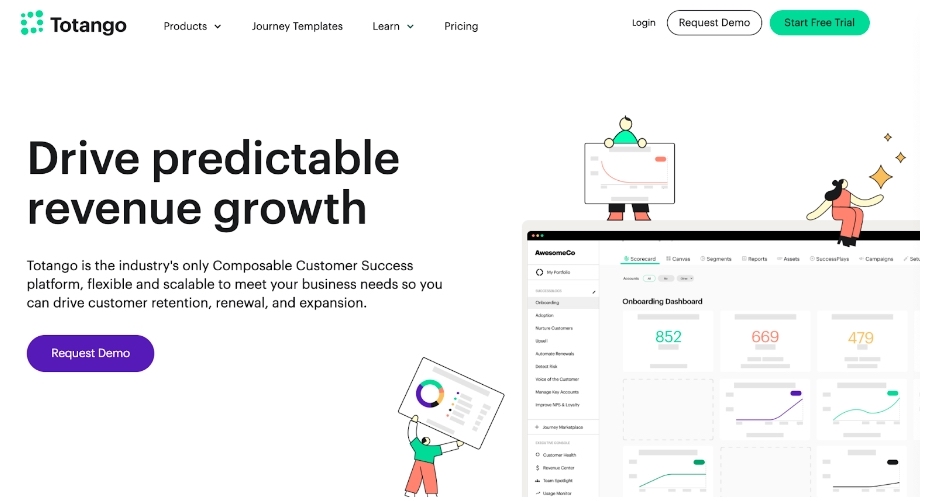
Totango lets you track and improve customer health and engagement. Totango helps you gain insight into particular groups so that you can understand the risk of each segment at a glance.
Features:
- Customer portfolio: Segment customers into groups and understand the health and risk of different segments.
- Real-time Alerts: Provides immediate updates when customer behavior changes or intervention is needed
- Dynamic assignment: Automates the assignment of customers to the most suitable customer success managers based on predefined rules
Price: Free up to 100 custom accounts and 1 user.
ChurnZero
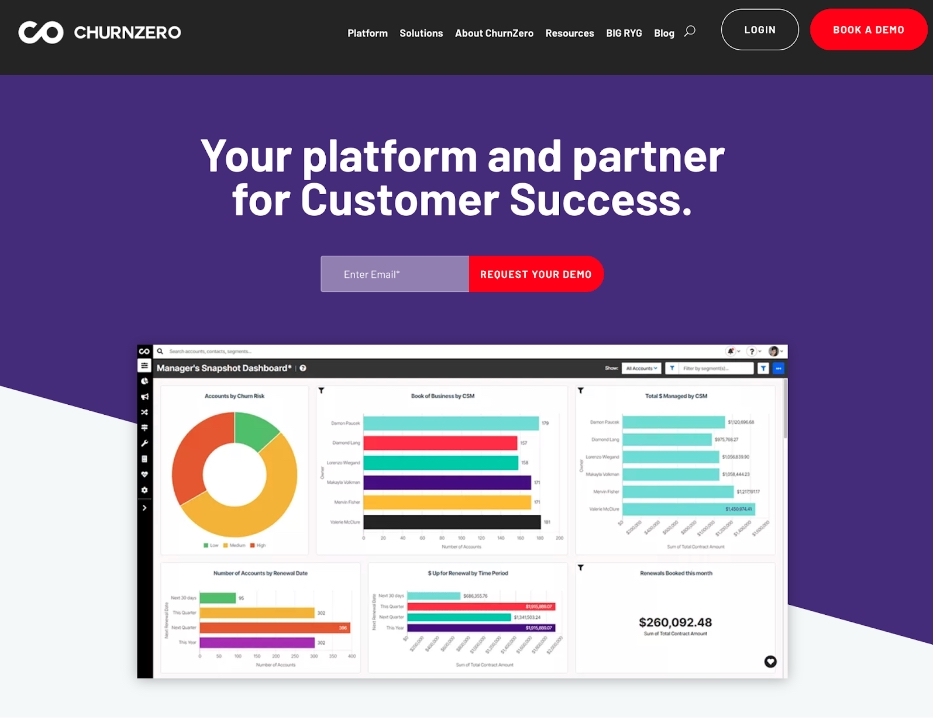
ChurnZero has one focus: tackling customer churn.
Say a customer is using your product more; ChurnZero will alert you in real time. You can then contact the customer, congratulate them, and offer my resources to support their growth.
Features:
- In-app integration: Provides insights about product usage directly from your product and allows in-app customer engagement
- Real-time alerts: Sends alerts when customers show signs of risk or opportunity
- Playbooks: Enables the creation of automated sequences of actions based on changes in customer behavior
- NPS Surveys: Built-in tool to collect and analyze customer satisfaction data directly within the platform
Price: Paid plans start at $6 per month for one user.
Customer success chat platform
This type of customer success tool lets you engage in real-time, direct conversations with customers. It often happens through a widget on a website or within an app.
Customer chat tools allow support and sales teams to assist customers by answering queries, solving problems, or providing information quickly and efficiently.
Here’s how most of these platforms work: Say you’re a global software company providing 24/7 customer support. When someone has a problem, they can start a chat and get instant help. If the chat agency can’t resolve the issue immediately, they can turn it into a support ticket for follow-up.
Two widely-used chat platforms include Intercom and LiveChat.
Intercom
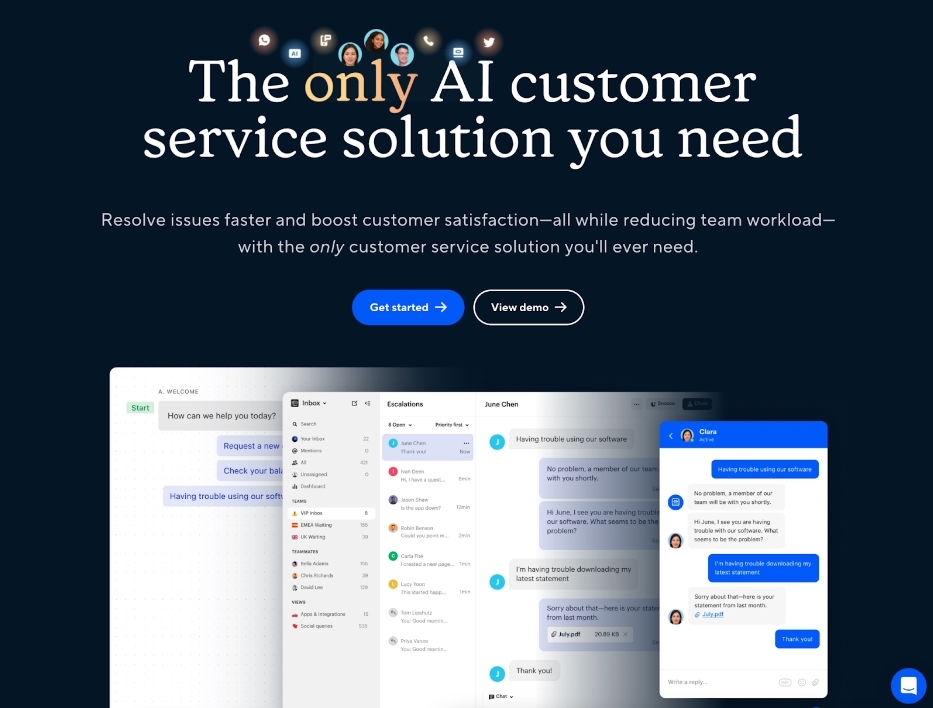
Intercom helps you connect with customers on your website, in mobile apps, and by email.
Features:
- Real-time messaging: Customers can have live conversations with businesses
- Automation & bots: Intercom’s Answer Bot can automatically answer common questions when your team is busy or off-duty. It uses machine learning to improve its responses over time
- Segmentation: You can segment customers based on data like location, behavior, and more. This can enable you to deliver personalized messages and experiences
- Product tours: With Intercom, you can create interactive walkthroughs of your product to onboard and educate users
Price: Starts at $74 per month.
LiveChat
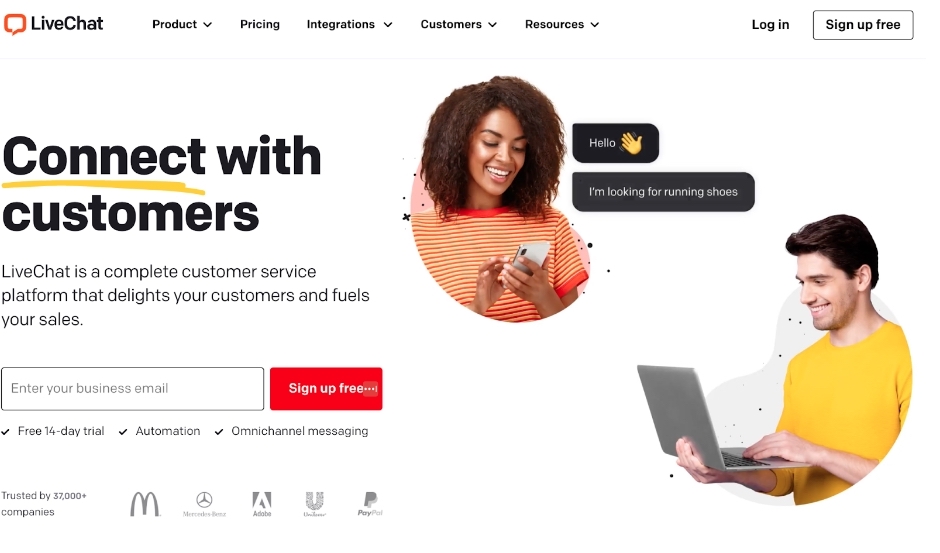
LiveChat provides live chat and help desk software.
Features:
- Live chat tools: Offers real-time chat, customizable chat widgets, simultaneous chats, and a chat transfer feature
- Ticketing system: When your agents are unavailable, LiveChat creates tickets from the chats. Agents can then follow up with customers once they’re available again
- Visitor information: Provides information about the customer’s location, the pages they visited on your website, their order history, and more
- Reports and analytics: Reporting features can help you understand chat frequency, agent activity, and customer satisfaction
Price: Starts at $20 per month.
Learning Management System (LMS)
A Learning Management System (LMS) plays a critical role in customer success and ongoing training for several reasons:
- You can provide accurate and updated information to customers
- Customers can get the most out of your products and services
That’s where the Learning Cloud from WorkRamp comes in. As an all-in-one LMS, the Learning Cloud provides everything you need for customer success and training needs.
Here are a few key features:
- Customizable learning paths: Create tailored learning modules that suit your customers’ needs. You can design learning paths based on expertise or familiarity and create a more personalized learning experience
- Interactive training modules: Use various eLearning content like training videos, quizzes, simulations, and more to keep customers engaged
- Certification programs: Design certification programs for customers and give them a sense of achievement with your product
- CRM integration: Integrate WorkRamp with popular CRM platforms like Salesforce to directly link customer training data with business impact
- Mobile learning: Let customers learn on the go and at their own pace
These features make WorkRamp an efficient CSM tool for creating a more satisfied customer base. Quantum Metric, for example, wanted to help their customers get up to speed on their product. So, they created Quantum Metric University.
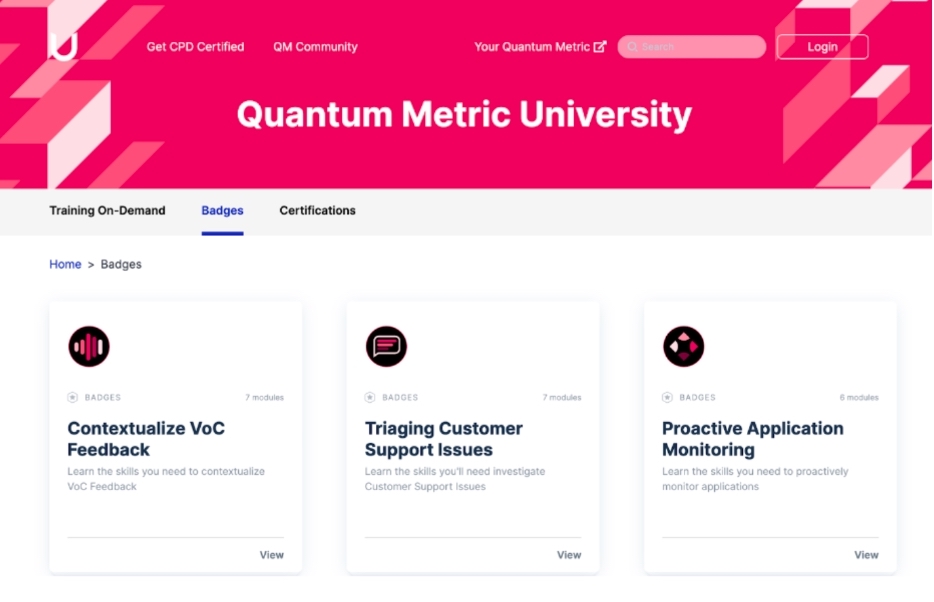
At Quantum Metric University, customers can:
- Access on-demand training courses
- Earn badges and rewards
- Get certified and become product experts
Price: Request pricing on website.
Customer success certifications
Customer success certifications equip you with the knowledge and skills to succeed in a success role.
It doesn’t matter whether you’re a CSM, account manager, or even in sales and marketing, the following certifications can help:
- Customer Success Manager Certification by SuccessCOACHING
- Gainsight’s Customer Success Certification for CS Teams
- Cisco’s Customer Success Manager (CSM) Certification
- PracticalCSM Customer Success Management Certification
Customer success courses
Not ready for a certification yet? No problem.
Let’s look at some courses and programs that cover certain aspects of being a CSM.
- CSM Practice – Customer Success Workshop
- Customer Success Manager: Fundamentals to your CSM career
- International Customer Management Institute (ICMI)- Managing difficult customers
- How to Get a Job in Customer Success Course
Empower your customers with the Learning Cloud
An LMS can make or break your customer success initiatives. From customized learning paths to live training sessions, you can improve customer satisfaction and retention with an LMS like WorkRamp.
Discover how to use the Learning Cloud to run an effective customer training program. Contact us today to schedule a free, personalized demo.
Complete the form for a custom demo.
Recent Posts
- Top LMS Integrations That Power Smarter, Faster Learning July 2, 2025
- Introducing WorkRamp Analytics Studio: Unlocking Your Data Insights with AI June 30, 2025
- 11 AI LMS for AI-Powered Learning June 27, 2025
- The Best LMS Platforms for Customer Retention (2025 Guide) June 27, 2025
- 11 Best AI Learning Platforms June 16, 2025
Michael Keenan
WorkRamp ContributorMichael is a SaaS marketer living in Guadalajara, Mexico. Through storytelling and data-driven content, his focus is providing valuable insight and advice on issues that prospects and customers care most about. He’s inspired by learning people’s stories, climbing mountains, and traveling with his partner and Xoloitzcuintles.
You might also like
The types of customer education tools your team needs
Customer education tools exist to make your life easier. From proactively providing support to surveying learners on autopilot, investing in the right customer education tools can pay dividends in the long run.
Read More
The customer enablement tools you need
Planning a clear post-sale strategy with the right customer enablement tools allows you to build relationships and help users get the most from your products.
Read More
Increasing product adoption and improving customer engagement
Discover how five WorkRamp customers use Academies to engage customers for better business outcomes.
Read More
Decrease Ramp Time and Increase Revenue
Get in touch to learn how WorkRamp can help you achieve your learning and development goals.
Request a Demo